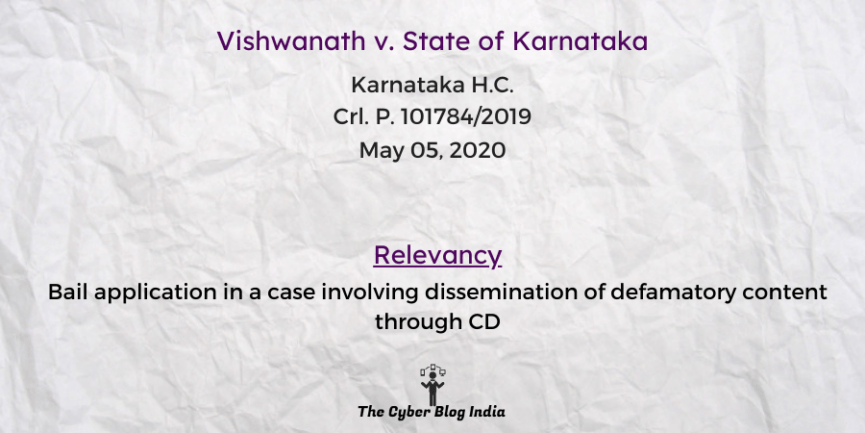Vishwanath v. State of Karnataka

Vishwanath v. State of Karnataka
(2021) 2 AIR Kant R 146
In the High Court of Karnataka
Crl. P. 101784/2019
Before Justice Suraj Govindaraj
Decided on May 05, 2020
Relevancy of the case: Bail application in a case involving dissemination of defamatory content through CD
Statutes and Provisions Involved
- The Information Technology Act, 2000 (Section 67)
- The Code of Criminal Procedure, 1973 (Section 196, 196(1)A, 197, 199, 339, 321, 482)
- Indecent Representation of Women Prohibition Act, 1986 (Section 4, 6)
- The Indian Penal Code, 1860 (Section 34, 120B, 153A, 295A, 298, 500, 505(2), 511, 292, 419, 469, 149, 499)
Relevant Facts of the Case
- The government handed over the management of a temple to a Mutt in Hosanagar. The petitioners, who were Vedic scholars and priests, and the general public, opposed this move.
- The Mutt brought legal action against some people including the petitioners.
- The respondents alleged that they were distributing CDs and handbills containing defamatory and derogatory content against the Mutt and its pontiffs.
Prominent Arguments by the Advocates
- The petitioner’s counsel argued that the offences levelled by the respondents require prior sanction from the government to start the investigation.
- The petitioner’s counsel also submits that as there was no dissemination of content over the internet or social media websites, hence Section 67 of the IT Act, 2000 was not attracted.
- The respondent’s counsel stated that the video would come under the Information Technology Act, 2000 because it was recorded on a CD and was also distributed.
Opinion of the Bench
- The court held that the definition of electronic forms under the Information Technology Act, 2000 would include CDs.
- The bench also held that the publication done through CDs was defamatory according to Section 153A of the Indian Penal Code, 1860.
- The court remarked that there was transmission and publication by utilising CD, and it would be mean dissemination.
Final Decision
- The petition stood dismissed.
This case summary has been prepared by Tuba Aftab, an undergraduate student at IIMT & School of Law, GGSIPU, during her internship with The Cyber Blog India in May/June 2021.
